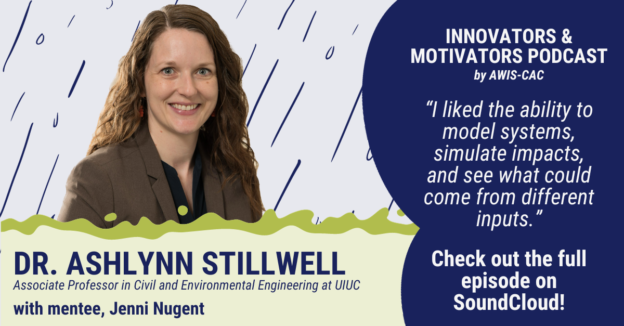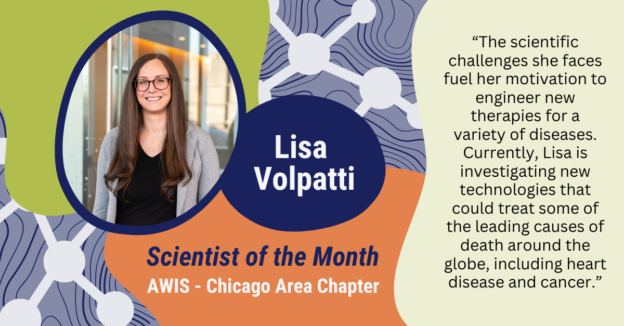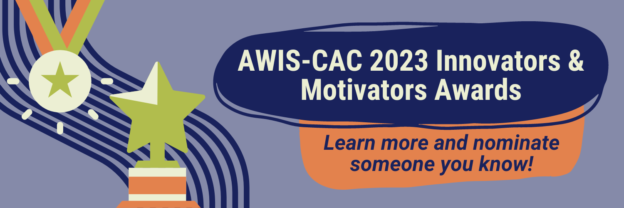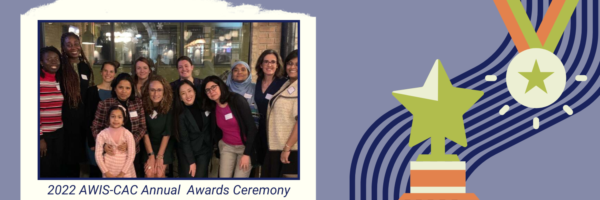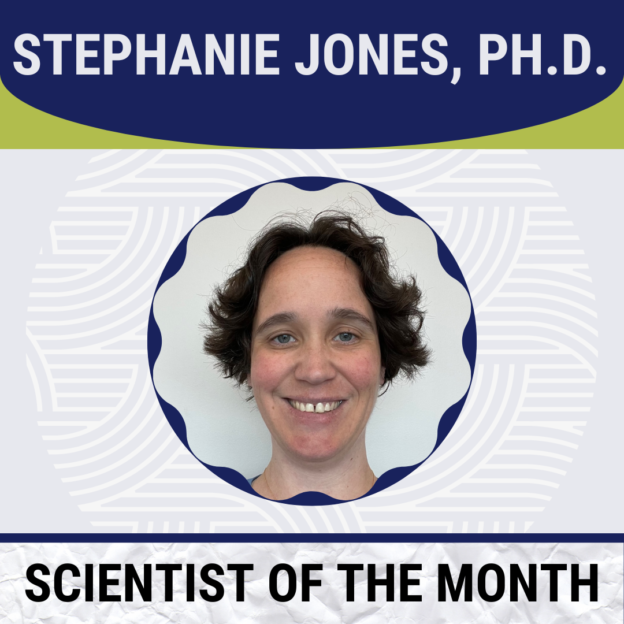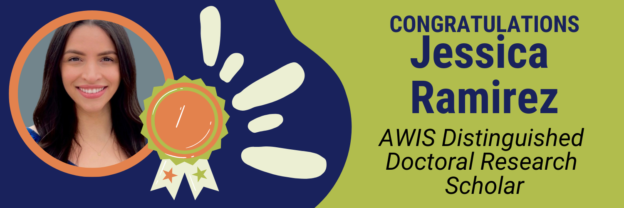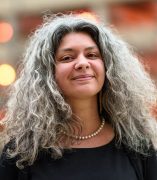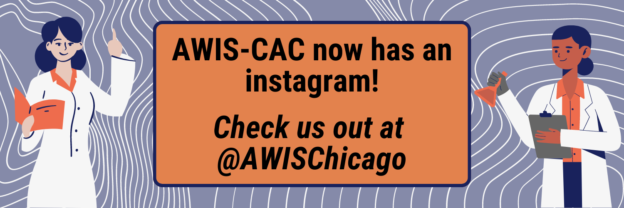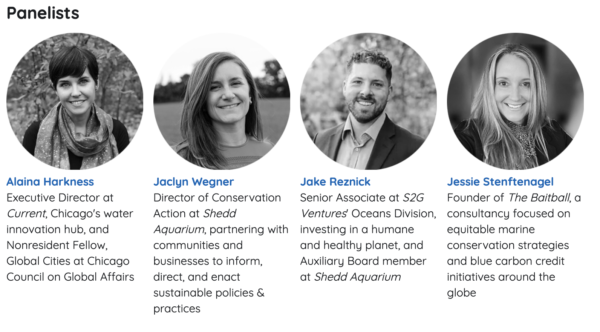Written by Christina Nowicki, Ph.D.
Jessica Ramirez, M.S., is currently a Ph.D. candidate in Integrative Biomedical Sciences at Rush University in ovarian cancer research. She is a current AWIS-CAC member and a recipient of the 2023 AWIS Distinguished Doctoral Research Scholarship.
Jessica earned her BS in biology from Loyola University Chicago, before working at Rush University Medical Center in the Flow Cytometry, Molecular Oncology, and HLA laboratories as a laboratory technician for five years. During this time, she received her M.S. in molecular medicine from Drexel University while completing her thesis on lung cancer with the Molecular Oncology Laboratory at Rush University. She then began her Ph.D., also at Rush University, in 2020 in Dr. Animesh Barua’s laboratory for translational research in ovarian cancer. Here, her thesis currently focuses on aging and ovarian cancer. The goal of her research is to identify factors or biomarkers that could lead to advancements in early detection methods for ovarian cancer.
Check out our scholarships page for more information about scholarships for women in STEM!
Tell me a little about your background. What made you want to get into science?
Growing up, my family was always big on science. My dad was a chemical engineer, so he was already in a STEM field. He really pushed us to be the best that we could be in those fields. For me, I just ran with it. In the summertime for fun, we would do math and science books for kids. I know that’s weird, but that’s what I would do. I still had friends I would hang out with! Progressing, going into high school, math and science were always the two subjects I loved most.
How did you initially become involved/interested in cancer research?
When I started college, I took a human genetics class and loved it. The professor was amazing, and she made the information easy for students to understand. For my undergraduate, I did a biology degree and started working at Rush immediately afterward. I started as a lab technician in the flow cytometry department, as well as HLA (human leukocyte antigen) testing, and then moved to molecular oncology. While I was working there, I pushed because I wanted to learn more and didn’t want to get bored doing the same repetitive task. So, they continued to train me, ultimately leading to molecular oncology. That’s what really started my love for research in oncology.
While working there, I knew I wanted to return to school and began a master’s degree in molecular medicine through Drexel University. I loved it because you could do your degree online and I didn’t have to stop working. Since I was already working in molecular oncology, I was able to do my thesis research with the director at the time. I continued to work after that, but knew I still wanted to go further. That led me to the Integrative Biomedical Sciences program at Rush, and it just took off from there. Working at Rush in the oncology field and being connected firsthand to the pathologists and oncologists there made me realize “Cancer research is what I want to do”.
What is your Ph.D. thesis currently on?
My research focuses on aging and the development of ovarian cancer. Women are typically diagnosed with ovarian cancer in their early to mid-60s. When you age, your cells are exposed to chronic inflammation and oxidative stress. My work aims to find mechanisms or biomarkers that influence chronic inflammation and oxidative stress that can lead to the onset of ovarian cancer. This includes looking at ovaries, fimbria, epigenetic changes, or if there are any mutagenic DNA adducts that form.
Another section of my research also focuses on how we can reverse epigenetic changes. We’re asking, “if we see these epigenetic changes occurring and what mechanisms lead to those changes, how can we reverse them?” That’s where Withaferin A comes into play, which is the active ingredient in ashwagandha. We’re interested in looking at age-associated malignant transformation and how Withaferin A could possibly reverse these changes to prevent or slow the progression of ovarian cancer.
Why ovarian cancer specifically?
Women who get diagnosed with ovarian cancer often don’t get diagnosed until the late stages because many are asymptomatic, so they believe the symptoms they’re having are part of the normal progression of menopause. Unfortunately, that’s why a lot of doctors also miss the initial symptoms.
There are also invasive procedures required to have ovarian cancer diagnosed. We’re interested in finding an early detection mechanism or creating an early detection product that isn’t as invasive as current methods but is still reliable. The blood/serum marker they currently use to detect ovarian cancer is not reliable. Sometimes, it has lower expression even if you have ovarian cancer or will show increased expression if you instead have an autoimmune disease. The end goal of this research is to identify markers that could lead to the diagnosis of ovarian cancer at earlier stages with less invasive methods.
What are your plans/career goals after you graduate?
I would like to go into the industry field, specifically as a medical science liaison. I like that they’re a middleman between a product and physicians. I did KOL (key opinion leader**) engagement when I was doing research and I really enjoyed it. I’m hoping to stay in oncology, not necessarily ovarian cancer, but I would like to stay in the cancer field.
How has being a woman in science impacted your career? How has being a member of AWIS benefited your journey?
Growing up from elementary all the way to college, I’ve always been one of a handful of women in my courses. For a long time, it seemed so male-dominated that it could be a bit discouraging. Unfortunately, some professors would dismiss you or even talk down to you. On the other hand, you’d have other professors that were all about lifting you up and pushing you to do the best that you could. I don’t want to say it’s been challenging, but it has been an interesting journey.
I do see things slowly changing, though. Like AWIS – it’s amazing to have this community that pushes women to do and be their best. And further, having scholarships to help get them to the next level hugely helps the community. I get a bit emotional talking about it.
I come from a family where in my dad’s generation, the women weren’t allowed to go to school past high school because it was thought they needed to be home taking care of their family. My dad raised three girls and that’s why he pushed us so hard in science. He knew we could advance in STEM and wanted to give us opportunities his sisters never had. It’s great to see AWIS and other organizations also pushing to make a change.
If you had one piece of advice for girls entering the STEM field, what would it be?
Try to find a person, group, or organization that will give you support within your field. It’s easy to become and feel discouraged when things don’t pan out the way you’ve planned but having that support system can help through the rough times and keep you from giving up. Always remember, there is nothing wrong with standing out and being confident.
**KOL (key opinion leader): A well-known and trusted professional who is an expert in their particular field. For example, a well-respected physician who gets reports on research and helps to decide how to implement that research in a clinical setting.

